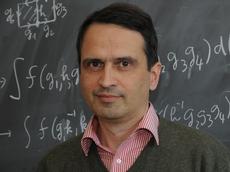Cradle of free-thinking
A professor of mathematics at ETH Zurich for sixteen years and now the director of the new Institute of Theoretical Studies: Giovanni Felder on the advantages of such a think-tank, his time at Princeton and why he has great respect for this new role.

Mr Felder, you were approached for the position of director of the new Institute of Theoretical Studies at ETH
Zurich. Did you need much convincing?
Although I was immediately sold on the idea of such an institute at ETH Zurich,
I did hesitate for a moment because the post carries a huge amount of
responsibility. Then I saw that I could count on the support of colleagues who
are well-connected internationally and who truly believe in this visionary idea
enough to be willing to help get it up and running.
In many respects, the ITS is a special case – not least thanks to the CHF
50 million in private funding. Do you feel privileged?
Absolutely. It’s such a stroke of luck that two former members of ETH Zurich
are making such a vision possible through an extremely generous donation. We
owe a huge debt of gratitude to the donors Max Rössler and the Walter Haefner Foundation,
represented by Martin Haefner, for believing in the importance of theoretical
basic research and showing such faith in their alma mater.
Who will be conducting research at the ETH-ITS in the future?
On the one hand, we’ll invite successful scientists as “senior fellows”, from
whom we can expect top-notch scientific input. On the other hand, “junior
fellows” – in other words outstanding young researchers from the fields of mathematics,
theoretical science and theoretical computer science – can apply to the
institute after their doctorate. These junior fellows might be promising
candidates for a subsequent career at ETH Zurich.
The ITS is supposed to boost theoretical basic research. Doesn’t ETH
Zurich already provide sufficient leeway to develop and discuss theories?
Certainly. Researchers from ETH Zurich are already engaged in a lively exchange
with scientists from all over the world and many new results are being presented
and discussed. However, the new institute offers something we haven’t yet got in
three respects: firstly, it makes longer stints possible for researchers here
in Zurich. Secondly, the ITS isn’t associated with one particular department,
which means researchers from different disciplines can collaborate freely – the
existing visit programmes being anchored in the departments, which complicates
the interaction between the various fields. Finally, the ITS makes ETH Zurich
very attractive for young researchers in mathematics and the theoretical
sciences, only a handful of whom we have been able to accommodate until
now.
The Institute for Advanced Study in Princeton (IAS) is regarded as a
source of inspiration for many similar institutions. You know the IAS from
experience. What makes an institute like this so special?
Institutes like the IAS in Princeton, the Institut des Hautes Etudes
Scientifiques near Paris or Newton Institute in Cambridge are pivotal for
research in the theoretical subjects. They offer the possibility of devoting
oneself fully to research without any administrative constraints and teaching
obligations, and discussing with other researchers who aren’t side-tracked by
other duties either. Such a setting provides the leeway for researchers to
become creative and new ideas to take shape.
What did you gain from your stint at Princeton?
A lot – not least something extremely personal: one of my sons was born during
our time at Princeton. As a young researcher, I was exposed to different ways
of thinking there and I met other researchers who were all in this special
“mode”, too. It was fantastic. I established contacts and even friendshipswhile
some of the ideas we developed there had a major influence on my research later
on down the line. Looking back, I consider the time I spent at the IAS a
tremendous privilege.
What will it take for the fellows to actually make a impactful mark at
ETH Zurich and essentially give precedence to Zurich as a research hub?
The ITS needs to become a place where members of ETH Zurich and the fellows can
meet informally and guests become involved in ETH Zurich’s scientific
activities. Events like conferences, workshops and seminars that also involve
doctoral and other students of ETH Zurich foster contacts and have a lasting
impact.







READER COMMENTS